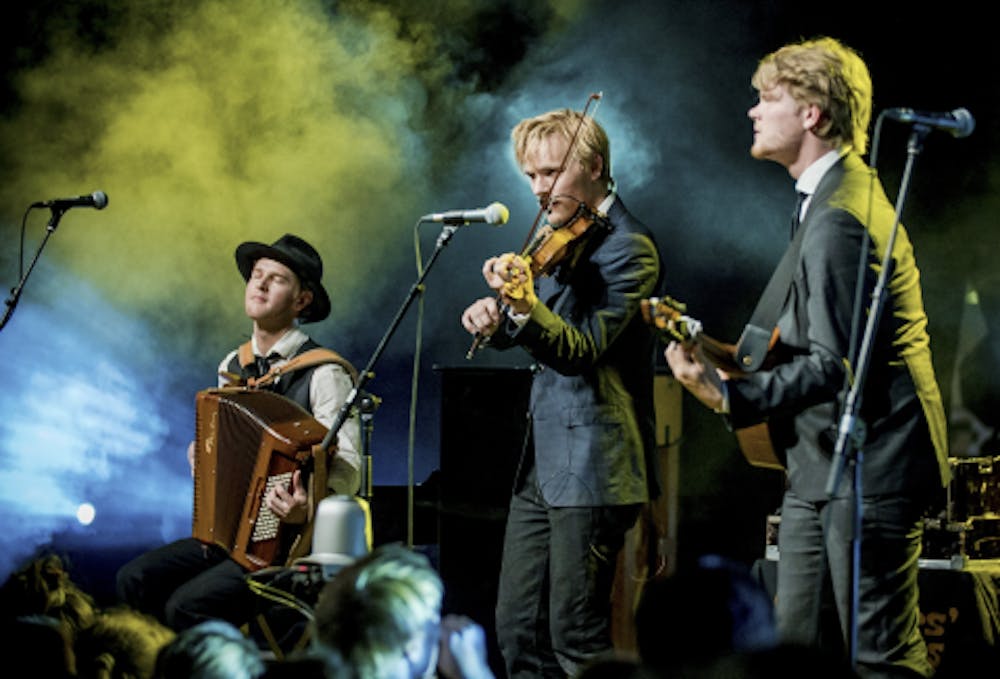An aura of anticipation filled the air last Saturday evening as a nearly full house packed into McCullough Student Center for the return of Nordic music group Dreamers’ Circus. The Wilson Hall stage was packed with over a dozen instruments ranging from a traditional cittern (similar to a lute) to a modern electronic synthesizer, setting the group up for an exciting show. Made up of three highly acclaimed musicians, two from Denmark and one from Sweden, Dreamers’ Circus returned to campus on Oct. 7 as part of their fall 2023 tour after performing at Middlebury three years ago, just before the Covid-19 pandemic. As Ale Carr, Rune Tonsgaard Sørensen and Nikolaj Busk took to the stage, with the lights beginning a colorful, patterned dance, it felt like a triumphant and long-anticipated return for the traditional Nordic band.
The group’s musical repertoire is rather hard to define, drawing on an eclectic variety of traditional Scandinavian and modern music traditions. Incorporating multiple generations of music into their show, Dreamers’ Circus began with slow, hypnotic and traditional-sounding folk music, yet ended with a techno-sounding beat to the tune of one of the members whistling to techno-synth beat.
Audience member Kevin Toohey described how the music provoked conflicting emotions for him.
“I felt initially drawn into the music and then I became aware of an emotional component to the sound, almost like having to cry, and simultaneously hearing this heroic, Scandinavian component that made me think of truth, beauty and goodness,” Toohey told The Campus.
Not only was the group’s setlist musically diverse — ranging from slower tunes that had audience members mesmerized with emotion to faster songs during which the entire audience was stomping and clapping in unison — but within each song lay a tension between the traditional and the modern. Annette Seidenglanz, a community member who attended the concert, described the performance as part of an important conversation about the role of creativity in challenging societal norms.
“I have heard indigenous artists say that it is important to honor tradition but if the work is not also innovative, then it's no longer a living art and the traditions will become empty of feeling and die out,” Seidenglanz said. “Dreamer's Circus performance is full of creativity, musicianship through their traditional music. That's what makes it fresh and exciting.”
Perhaps one of the more unique aspects of the Dreamers’ Circus’ performance was the visual and non-musical elements of the performance. The group used colored lighting for each of their songs to set a different tone as they switched between slow and fast, alternating between folk and techno music. The physical movements of the dancing musicians, who also made eye contact with one another and switched around their spacing on stage, further enhanced the audience’s experience.
Sweden-based Carr, who is recognized as one of the best players of plucked string instruments in the Nordic musical tradition, mainly played the cittern and kannel, an Estonian plucked string instrument. Easily the most physically dynamic performer on stage, Carr moved deftly from sitting to standing, having his eyes closed to intently staring into the eyes of his bandmates. Reflecting on what physicality means to him, Carr told The Campus that he sees movement as necessary to have a fully embodied experience of music.
“The music isn’t in my instrument but it's living in my whole body,” Carr said. “A phrase isn’t just in my fingers but it’s in my feet and my shoulders too.”
Dreamers’ Circus is also committed to relying heavily on improvisation in their shows, selecting their setlist on the day of each performance, and encouraging themselves to improvise their physicality on stage. The group also chooses the specific lighting for each show to reflect both the mood of each song they are playing that day and to allow for a wide range of interpretations from the audience.
Audience member Lucia Snyderman ’23.5 picked up on how important mood and emotional relatability is to the group’s music. She also reflected on how universal the shared experience of listening to a musical group perform can be.
“Music transcends all boundaries between people and connects people of all ages and backgrounds, and what this folk music does is also pushes boundaries and lets you feel what you want to,” Snyderman said.
The Dreamers’ Circus will continue on their fall U.S. tour this month with upcoming performances in Los Angeles and San Francisco on Oct. 13 and Oct. 15, respectively.




